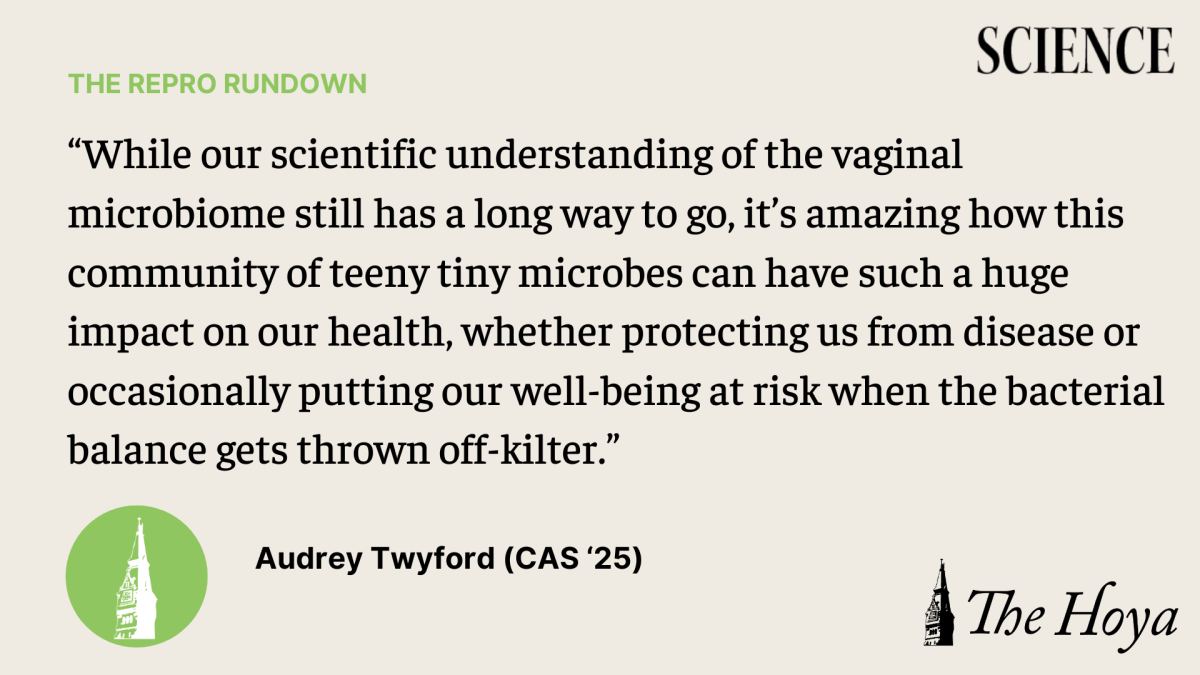
In this installation of her column "Repro Rundown", Audrey Twyford (CAS '25) explains how our vaginal microbiome can contribute to our sexual health and wellbeing.
You’ve probably heard of the gut microbiome — the ecosystem of bacteria, fungi and viruses that help you get nutrients from food — but did you know that your vagina has its own microbiome, too? The vaginal microbiome is amazing — it can protect you from infection and support your sexual health. Plus, everybody’s microbiome is unique, just like a fingerprint. My vagina might contain more of one type of microorganism (or “microbe” for short), while yours probably contains more of another.
So, how exactly does the microbiome contribute to vaginal health? Mainly, these microbial communities can help you by preventing replication of pathogenic bacterial strains — that is, nonharmful microbes can suppress the growth of “bad bacteria” that cause vaginal health problems like bacterial vaginosis (BV) and yeast infections. Though the vaginal microbiome contains over 250 different kinds of bacteria, only certain species — those nonharmful microbes — are highly prevalent in adults with healthy vaginas. These helpful species usually belong to the Lactobacillus genus and are MVPs in keeping our vaginas healthy.
Lactobacilli — particularly one species called Lactobacillus crispatus — make an important chemical called lactic acid, which helps keep the vaginal ecosystem acidic. That acidity is one of the vagina’s critical defense systems, as the low pH environment restricts the growth of less friendly microbes that cause disease.
When “bad bacteria” experience rapid, unchecked growth, they can make you sick by throwing the vaginal ecosystem out of balance. Think of the vaginal microbiome as an ocean ecosystem. When the ecosystem is healthy, each species plays a crucial role in maintaining ecological balance, with interactions between different kinds of bacteria and fungi contributing to overall vaginal health. Similarly, a small population of sharks in the ocean will keep the ecosystem balanced, but if the shark population explodes, they’ll eat all of the fish, sending the whole ocean into chaos.
There are a lot of forces that can upset the balance of your vaginal microbiome: Menstruation, stress, antibiotics and sexually transmitted infections can all temporarily shift the composition of your vagina’s microbe population. The most common kind of harmful imbalance is BV — in fact, about one in three adult women will contract BV in their lifetimes, including many college-aged individuals. While you don’t have to be sexually active to get BV, it is more common among people who do have sex. Thankfully, BV is usually mild and can typically be cured by antibiotics, which alleviate common symptoms such as discolored vaginal discharge, itching around the vulva and unpleasant vaginal odor.
So, why do women get BV so often? Usually, it happens when the “good bacteria,” Lactobacilli, are overtaken by large numbers of disease-causing bacteria, like certain strains of Gardnerella, one of the most common species responsible for BV. When there are suddenly fewer Lactobacilli, the vagina’s pH becomes less acidic, allowing bad bacteria like Gardnerella to thrive. These problematic species often produce smelly molecules in the vagina, which is why BV is associated with a stinky, even “fishy” odor.
It may seem surprising, but one way women may inadvertently increase their risk of BV is through vaginal douching, which can quickly throw the microbiome out of balance. Douching is when women use soaps or other liquids to wash out the inside of their vagina. However, doctors recommend that you do not douche — the vagina is a self-cleaning organ and doesn’t need to be rinsed out. That’s because it’s coated with cervical mucus that flows out of your body as discharge, flushing out things like bacteria and dead cells.
Despite this amazing self-cleaning mechanism, some young women still might feel that they should douche due to societal pressures or marketing campaigns based on the message that women’s bodies are unclean or a source of shame. However, studies indicate that douching is ultimately unhealthy, since it represses the growth and abundance of those helpful Lactobacilli, allowing bad bacteria to flourish. Therefore, though you might think you’re helping your body stay clean, douching can actually make you more vulnerable to infection.
While our scientific understanding of the vaginal microbiome still has a long way to go, it’s amazing how this community of teeny tiny microbes can have such a huge impact on our health, whether protecting us from disease or occasionally putting our well-being at risk when the bacterial balance gets thrown off-kilter. By learning more about the vaginal microbiome, you can be sure to take good care of the little vaginal microbes who take such good care of you!